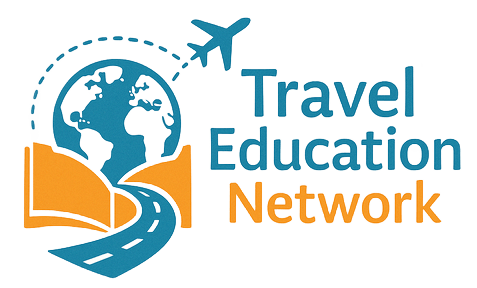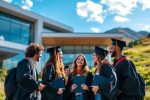Travel Is the Best Education: Stories from Students Who Learned Abroad
Want to transform your education? Travel offers invaluable real-world experiences, boosting essential skills like adaptability and problem-solving. From navigating bustling foreign cities to immersing yourself in new cultures, travel fosters independence and broadens perspectives. Discover how exploring the world can enrich your learning journey and fuel personal growth. Read on to find out more.
Important information

- Travel provides experiential learning that goes beyond textbooks, fostering adaptability and problem-solving skills.
- Cultural immersion cultivates empathy, broadens perspectives, and enhances cross-cultural understanding.
- Navigating unfamiliar environments builds independence, resilience, and confidence.
- Travel improves language skills through real-world practice and interaction with locals.
- International experiences expose students to global issues, prompting critical thinking and personal growth.
Why Travel is the Best Education for Students
Travel offers invaluable educational opportunities, broadening students’ perspectives through exposure to diverse cultures and customs. This experiential learning transcends textbooks, fostering adaptability and problem-solving skills as students navigate unfamiliar environments. Furthermore, travel nurtures independence and connects classroom learning to real-world experiences, enriching subjects like history, geography, and language studies. By encountering global issues firsthand, students develop empathy and cross-cultural understanding. These interactions within diverse communities cultivate essential life skills and personal growth.
The Role of Cultural Discovery in Learning
Cultural discovery is key to learning, fostering empathy, and understanding. Immersing ourselves in different cultures offers valuable insights into new perspectives and ways of life. This firsthand experience connects learning to the real world. For instance, observing daily routines, like family meals and celebrations, illuminates shared human experiences while showcasing unique cultural expressions. This deeper understanding enriches diverse fields, from history and sociology to literature and the arts. Moreover, cultural discovery fuels personal growth by challenging preconceptions and broadening perspectives. Navigating unfamiliar environments hones valuable skills, teaching us to adapt and problem-solve in new social contexts. Ultimately, cultural discovery is a truly enriching experience.
Emotional Experiences and Their Impact on Personal Growth
Travel is a powerful catalyst for personal growth due to its emotional intensity. Navigating unfamiliar environments fosters independence and resilience. Immersing yourself in different cultures broadens your perspectives and enhances self-awareness. Every experience, from the thrill of discovering new places to the occasional pang of homesickness, deepens your emotional understanding. Challenges are inevitable, but they cultivate valuable problem-solving skills and adaptability. Stepping outside your comfort zone boosts self-confidence. Successfully navigating a foreign city solo or overcoming a language barrier can be incredibly empowering. Travel shapes us, fostering both emotional intelligence and resilience.
Independence and Problem-Solving: Key Skills Developed Through Travel
Traveling, especially navigating public transport in a new city or managing a tight budget, can significantly enhance your resourcefulness. Unexpected challenges, such as flight cancellations or language barriers, further sharpen your problem-solving skills. These experiences foster independence and boost your confidence in handling unforeseen situations.
The Educational Benefits of Travel
Travel is an incredible teacher, blending academic knowledge with real-world experiences. It enhances language and communication skills, offering lessons far beyond the traditional classroom. Travel fosters cultural understanding and personal growth by exposing students to diverse perspectives and lifestyles. It also cultivates adaptability, problem-solving, and critical thinking as students navigate unfamiliar environments and overcome challenges. Interacting with local communities provides a deeper understanding of global issues, creating a more well-rounded education that instills gratitude and perspective.
Language and Communication
Immersing oneself in new cultures and languages accelerates learning. The invaluable practice of real-world communication improves fluency, comprehension, and confidence, essential skills in our interconnected world.
Cultural Understanding
Cultural immersion fosters cross-cultural understanding. Exposure to diverse perspectives, beliefs, and customs cultivates empathy and appreciation for cultural differences, broadening students’ worldviews.
Personal Growth
Stepping outside their comfort zones encourages self-reflection. Students discover their strengths and weaknesses, gaining self-awareness. Travel fosters independence, resilience, and confidence—qualities essential for personal growth.
Language Learning and Communication Skills
Traveling significantly improves communication skills. Interacting with locals provides authentic conversational experiences, especially helpful for language acquisition. Immersing yourself in a new language through daily use accelerates learning beyond the confines of a classroom. While structured language courses are available in many destinations, even casual conversations with locals enhance vocabulary and fluency. Simple interactions like ordering food or asking for directions contribute significantly to language development. Travel enriches and expedites language learning. Here’s how travel boosts your communication abilities:
Real-world practice: Travel offers continuous opportunities to use a new language in authentic situations. This immersive experience is far more effective than classroom learning.
Accelerated learning: Daily interactions in a foreign language environment significantly boost vocabulary acquisition and fluency.
Enhanced cultural understanding: Communicating with locals provides insights into cultural nuances, improving overall communication effectiveness.
Improved confidence: Successfully navigating everyday situations in a new language builds confidence and reduces communication anxieties.
Increased adaptability: Travel exposes you to various communication styles, enhancing your ability to adapt and connect with diverse individuals.
Exploring Global Classrooms: A Cross-Cultural Understanding
Global Classrooms offer invaluable firsthand experiences with diverse cultures, fostering empathy and a deeper understanding of global issues. Navigating unfamiliar environments cultivates adaptability and resilience. Interacting with new people hones communication and interpersonal skills. These enriching experiences broaden perspectives and challenge preconceived notions, taking students’ education far beyond textbooks. Global Classrooms nurture personal growth and cross-cultural understanding, preparing students for an interconnected world.
Personal Development: Self-Discovery and Identity Formation
Traveling broadens your horizons and fosters self-discovery. Immersing yourself in new environments challenges your perspectives, leading to introspection and a deeper understanding of yourself. Navigating unfamiliar situations cultivates resilience and adaptability, shaping your identity. Interacting with diverse cultures expands your worldview and refines your sense of self. Every travel experience, positive or challenging, fuels personal growth and strengthens your identity.
Travel as Experiential Learning
Travel transforms the world into a vibrant classroom, offering dynamic lessons beyond textbooks. Experiential learning enhances traditional education by providing real-world context. For example, visiting historical sites brings history to life far more impactfully than reading. Travel also builds essential skills like adaptability and problem-solving, crucial for navigating unfamiliar situations. These encounters broaden perspectives and challenge assumptions, fostering empathy and cross-cultural understanding.
Moreover, travel inspires us by exposing us to diverse cultures and beliefs. Adventure travel, such as trekking through a rainforest or exploring ancient ruins, offers unique learning experiences not found in traditional classrooms.
These adventures cultivate curiosity and inspire a lifelong love of learning.
The World as Your Classroom: Lessons Beyond Traditional Education
Traveling outside of the classroom offers invaluable lessons, expanding cultural horizons, and fostering personal growth. Students gain new perspectives and develop practical skills, from budgeting and time management to problem-solving. Travel nurtures adaptability, open-mindedness, and empathy, providing unique insights that deepen one’s appreciation for the world.
Adventure and Exploration: Inspiration from New Cultures
Traveling broadens your horizons, offering a glimpse into diverse traditions and ways of life. Local arts, music, and cuisine can ignite inspiration, while unique architecture captivates the eye. These encounters foster creativity and expand perspectives. Exploring different cultures deepens your global understanding and nurtures personal growth. Travel is more than just sightseeing; it’s about forging a genuine connection with your destination.
Challenges and Growth Through International Experiences
Studying abroad immerses students in a new culture, complete with unfamiliar customs and cuisines. Social interactions also differ, presenting unique challenges. Overcoming these hurdles cultivates valuable skills like adaptability and cross-cultural understanding. Navigating a foreign public transit system or ordering food in another language, while sometimes difficult, ultimately builds confidence and resourcefulness.
In developing nations, students witness systemic issues like poverty and limited access to education and healthcare firsthand. These experiences foster empathy and a deeper understanding of global inequality. Many students choose to volunteer locally, gaining practical experience while contributing to positive change.
Such experiences can even inspire future careers in fields like international development or humanitarian work. Students develop a global perspective, becoming more aware of diverse viewpoints and approaches to problem-solving. The challenges and triumphs of studying abroad contribute significantly to personal and intellectual growth.
Adapting to New Cultures: Overcoming Discomfort
Embracing the unknown is key to adapting to new cultures. Navigating unfamiliar territories and encountering cultural differences can be challenging, but these experiences foster resilience and adaptability in students. They learn to embrace change, develop creative problem-solving skills, and gain confidence in handling unexpected situations. This newfound comfort with discomfort fuels personal growth and prepares them for future challenges in both travel and life.
While culture shock, language barriers, and homesickness are common hurdles. Adapting to new schools and social norms can be tough.
These challenges present valuable opportunities for growth. Students develop coping strategies and hone their problem-solving skills, further strengthening their resilience.
Engaging with local communities and building a support network can significantly ease the transition and enhance the overall experience.
Learning from Systemic Problems in Developing Countries
Students witness firsthand the harsh realities of poverty and inequality, including limited access to essential resources. This direct exposure cultivates a deeper understanding of our interconnected world, prompting critical thinking and inspiring action for positive change. These transformative experiences nurture empathy and foster a sense of global citizenship.
Student Stories: Learning Abroad
Exchange programs offer incredible benefits for international students, immersing them in new cultures and improving their language skills. These experiences broaden global perspectives as students adapt and solve problems in unfamiliar settings, fostering personal growth and forging lifelong international friendships.
Ecuador provides a rich cultural experience. Explore the Amazon rainforest, venture into the Andes mountains, and discover the Galapagos Islands. Students can learn Spanish, interact with indigenous communities, and even volunteer in local projects, further enhancing their cultural understanding and personal development.
South Africa offers unique adventures, particularly at the University of Cape Town (UCT). While providing excellent academics, UCT also encourages exploration of diverse cultures and incredible wildlife. Learning about South Africa’s history and natural beauty creates a truly transformative experience.
How International Students Benefit from Exchange Programs
International exchange programs offer incredible benefits for students, fostering adaptability and resilience as they navigate new environments. Immersing themselves in unfamiliar cultures cultivates valuable cross-cultural understanding through firsthand experience in diverse communities.
Furthermore, these programs unlock unique academic opportunities unavailable at home, fueling personal growth and independence. Students also enhance their communication skills and build invaluable international networks, boosting future career prospects.
Experiences in Ecuador: Cultural Immersion and Understanding
Studying abroad in Ecuador immerses students in a vibrant culture, allowing them to experience local traditions firsthand and gain a deeper understanding of Ecuadorian life. This significantly boosts their educational growth. Imagine participating in a colorful Andean festival or living with a host family in a rural community, sharing in their daily routines and gaining unique insights. These experiences forge a genuine connection with Ecuadorian culture. Living with a local family offers invaluable opportunities to improve language skills, discover authentic cuisine, and truly appreciate the nuances of Ecuadorian customs. Participating in local festivals provides a glimpse into the heart of Ecuadorian celebrations, fostering a deeper appreciation for the country’s rich heritage. These immersive encounters transform a study abroad program into a profound journey of cultural discovery.
South Africa Adventures: A University of Cape Town Perspective
The University of Cape Town (UCT) offers a unique academic adventure in South Africa, immersing students in a vibrant tapestry of cultures and social landscapes. This exposure provides invaluable perspectives on African history, politics, and contemporary societal challenges. UCT’s diverse student body fosters cross-cultural understanding and exchange, enriching the learning environment. Moreover, UCT champions community engagement and experiential learning within South Africa, promoting significant personal and academic growth for its students.
















